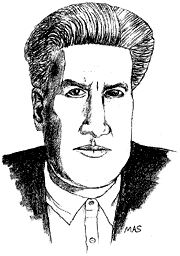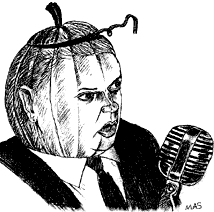Reviewers reviewed.
Movies
The Empire Strikes Back: Special Edition (Lucasfilm Ltd., 20th Century Fox). The second film in the Star Wars trilogy takes in $24 million its opening weekend and receives rave reviews. "Empire Strikes Back is the best of three Star Wars films," declares the Chicago Sun-Times' Roger Ebert. "It managed to prefigure the power-mad 80's," says the New York Times' Janet Maslin, comparing Darth Vader to merger-and-acquisitions-mad corporate titans. Luke Skywalker and Princess Leia are said to have matured into actual characters (as opposed to cartoon ones), and the sage Yoda makes his first appearance, "emerg[ing] from murky nature to become the spiritual center of the whole StarWars game," says the San Francisco Chronicle's Peter Stack. (Slate's Louis Menand explains Star Wars' appeal. You can also visit the official Star Wars site.)

Lost Highway (October Films). Critics denounce David Lynch's latest picture as a soulless knockoff of other Lynch movies (Blue Velvet, Wild at Heart, Twin Peaks: Fire Walk With Me). "We've visited this planet before," says Time's Richard Corliss. Among the elements of Lynch's self-plagiarism: an eerie soundtrack, creepy characters (femmes fatales, scary thugs, ghoulish freak), and lots of tawdry sex. Also, a shaggy-dog plot that defies the laws of time and space. "The cries of 'Cheat!' that attended the later episodes of Twin Peaks are likely to be heard again," says Slate's David Edelstein. On the other hand, the film is said to look great--"magnificent in the painterly way Mr. Lynch pioneered," says the Wall Street Journal's Joe Morgenstern. (Lost Highway's official site serves up bizarre promos.)
Rosewood (Warner Brothers). Based on a hitherto little-known 1923 incident in which a white mob pillaged a black Florida town, Rosewood is deemed important as history but insignificant as art. Director John Singleton (Boyz N the Hood) is accused of sentimentalizing his subject and resorting to action-film banalities--"a sorry assortment of dramatic and visual clichés that were retired from service, or should have been, decades ago," says the Wall Street Journal's Morgenstern. (Rosewood's home page has video clips and the like.)
Television
Schindler's List (NBC, Feb. 23). NBC earns kudos for its "sensitive" presentation of Steven Spielberg's 1993 Holocaust epic, which it showed without ads, under the sponsorship of Ford. But the praise is tempered by the observation that the film came in a package deal with Jurassic Park and was broadcast in the middle of February sweeps. Critics note two other ironies: 1) Schindler's List is the most graphic program ever shown on network television. 2) Ford has its own unacknowledged history of anti-Semitism. (Henry Ford once gave his workers free copies of The Protocols of the Elders of Zion.)
Miss Evers' Boys (HBO; click here for times). David Feldshuh's Pulitzer Prize-winning play about the notorious Tuskegee Experiment has been adapted for television to general acclaim. Alfre Woodard displays "sinewy intelligence and grace" (John Leonard, New York) and "unfailing dignity" (John O'Connor, the New YorkTimes) in the role of a black nurse who recruits black men for a government research project about syphilis. (The men go untreated, and 28 die.) Laurence Fishburne "underplays [one of the patients] to smoldering effect" (Leonard). (HBO plugs the movie at its site.)
Books
Monster: Living Off the Big Screen, by John Gregory Dunne (Random House). The inside story of how Dunne and wife Joan Didion turned the Jessica Savitch saga into the 1996 Disney picture Up Close and Personal makes the cover of the March 2 New York Times Book Review, although screenwriter Larry Gelbart summarizes, rather than evaluates, the book: "Monster offers a crash course in getting a script through the hazards of the present-day studio system." In the Los Angeles Times, producer/writer Michael Crichton applauds Dunne's breezy, professional tone: "Shock and petty moralizing are the mark of an outsider." The New York Review of Books complains that Dunne is too breezy: "This is what makes him so readable, but it doesn't give him a voice for brooding."
American Sphinx: The Character of Thomas Jefferson, by Joseph J. Ellis (Knopf). Historian Ellis earns praise for his contribution to Jefferson scholarship. Ellis' twist: He's a moderate who neither censures the author of the Declaration of Independence for his conflicted views on race nor dismisses his political beliefs as insincere. "Jeffersonism is not Clintonism," says historian Sean Wilentz in the New Republic. The Chicago Tribune, however, concludes that American Sphinx makes manifest so many inconsistencies in Jefferson's thought that it may unwittingly be "the most critical biography of Jefferson published in this century." (For more on the Jefferson debate, see David Greenberg's "High Concept.")

Whittaker Chambers: A Biography, by Sam Tanenhaus (Random House). Tanenhaus elevates Chambers to the pantheon of great American postwar intellectuals and declares Alger Hiss a Soviet spy, and no critics object. Even The Nation, famously defensive on the question of Hiss, calls the biography "an honest and indispensable book that goes a long way toward restoring to Chambers an elementary human plausibility" (gosh, thanks). Tanenhaus accuses Chambers of having inadvertently instigated McCarthyism, and "shows us Chambers' paranoia, his introversion, his sententiousness" (Stephen Koch, the Wall Street Journal). (Also, see Slate's mildly critical review by Ann Douglas.)
Theater
Stanley (Circle in the Square, New York City). Two weeks ago, art historian Simon Schama predicted in TheNew Yorker that Pam Gems' play about midcentury British painter Stanley Spencer, his wife, and his lover would be received--unfairly, claimed Schama--as "yet another formulaic contribution to the flourishing genre of painter-as-prick." Critics have proven him right. The play is "Spencer's life reduced to Two Weddings and a Funeral, a quaint and titillating Bloomsbury parallelogram," says the Wall Street Journal's Donald Lyons. All praise is reserved for the production itself: "The staging is infinitely inventive," says New York's John Simon. Actor Anthony Sher, as Stanley, is "astonishing, as though he were plugged into a power source the rest of the world had yet to discover," says the New York Times' Ben Brantley.
Update
The New Republic's Jed Perl trashes the late paintings of Willem de Kooning. The Museum of Modern Art exhibition "is something new--the first show dedicated to Alzheimer's chic."
Recent "Summary Judgment" columns:
Television--Thomas Jefferson;
Television--Emma;
Movie--Absolute Power;
Movie--Blood and Wine;
Book--Gladstone: A Biography, by Roy Jenkins;
Book--Asylum, by Patrick McGrath;
Book--Hungry Ghosts: Mao's Secret Famine, by Jasper Becker;
Art--"Henry Darger: The Unreality of Being."
CD--Pat Boone in a Metal Mood: No More Mr. Nice Guy, by Pat Boone;
Movie--Dante's Peak;
Movie--When We Were Kings;
Movie--Prisoner of the Mountains;
Book--What Falls Away: A Memoir, by Mia Farrow;
Book--Before the Dawn: An Autobiography, by Gerry Adams;
Book--A Supposedly Fun Thing I'll Never Do Again: Essays and Arguments, by David Foster Wallace;
Television--The Chris Rock Show.
Book--Personal History, by Katharine Graham;
Book--What It Means to Be a Libertarian: A Personal Interpretation, by Charles Murray;
Book--Do the Windows Open?, by Julie Hecht;
Movie--Gridlock'd;
Movie--Waiting for Guffman;
Art--"Willem de Kooning: The Late Paintings, the 1980s";
Theater--Men Are From Mars, Women Are From Venus;
Event--"On Cultural Power: The Wilson-Brustein Discussion."
Art--"Giambattista Tiepolo, 1696-1770";
Event--Halftime at Super Bowl XXXI;
Movie--Kolya;
Book--Island of the Colorblind, by Oliver Sacks;
Theater--The Steward of Christendom;
Movie--Fierce Creatures;
Book--Le Divorce, by Diane Johnson.
--Compiled by Franklin Foer and the editors of Slate.
